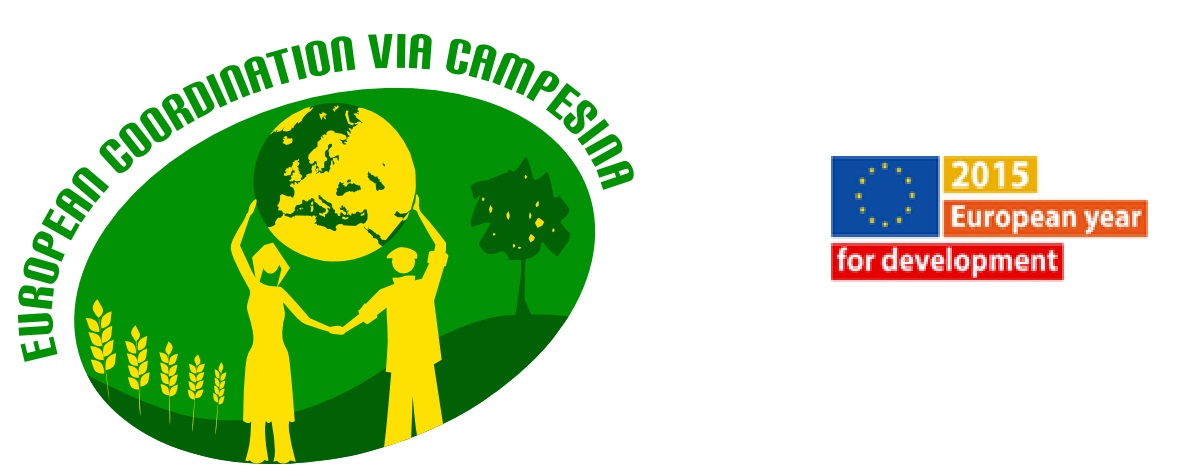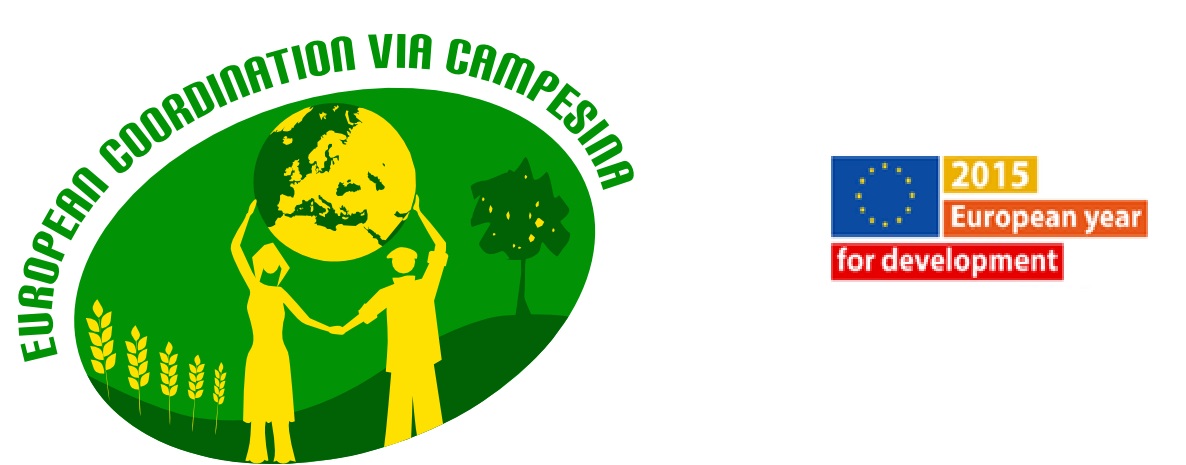European Coordination Via Campesina-highlights from the public debate “Agroecology in the EU”

 Information Note, Brussels, 23 September 2015 (Download PDF)
Information Note, Brussels, 23 September 2015 (Download PDF)
European Coordination Via Campesina organised a public debate and a press conference on “Agroecology in the EU”, on 17 September 2015, at the European Parliament, to share what agroecology means to farmers and discuss on public policies needed to support and implement agroecology in Europe. This debate was hosted by Lidia Senra, GUE MEP, and co-funded by the European Union.
Here below some highlights from the public debate speakers panels
Presentation of the declaration of the International Forum for Agroecology
Andrea Ferrante, ECVC Coordination Committee member, presented the declaration of the International Forum for Agroecology. Food producers organizations from all over the world have recently met in the international forum for Agroecology (Mali, February 2015) to develop a common understanding of Agroecology. The outcome is a milestone Declaration that ECVC thinks can be supported and developed within the EU.
Small scale farmers are more productive per hectare that the conventional agriculture
In her concrete and passionate speech, Jyoti Fernandes, ECVC Coordination Committee member, argued that agroecology is not a romantic notion and unrealistic farm activity. Multiple studies in Europe have shown that the productivity per hectare of agroecology is in many cases higher than in industrial farming. Agroecology offers diverse, healthy and quality food that does not create obesity, like industrial junk food. Agroecology is the backbone to food security in Europe and creates employment, so should be celebrated. Despite all that, the EU public policies like the CAP work against agroecology, as only 20% of the CAP subsides goes to small scale farmers.
Agroecology is central in all EU overall policy narrative
On the same line, Michel Pimbert, executive director from the Coventry University, continued saying that agroecology is in the earth of EU relevant research studies based on innovation and agroecological approaches. This is good news. However, agroecology has currently many meanings and definitions, adopted by many actors for different purposes, broadly either to confirm to agro-food regime, or transform it. For instance France is using the term of agroecology for business as usual. This is why it is important to find common understanding for agroecology in the spheres of employment creation, solidarity economy and diversity of food production for citizens.
Progressive policy makers should support more Agroecology research through public spending.
Key challenges for scaling-up agroecological approaches
Stéphane Parmentier, Oxfam-Solidarity, Belgium, underlined that support for establishing agro ecological networks is needed. Agricultural and trade policies should be designed in support of peasants and agroecological farming. Agroecology has a great potential for empowering women, but this does not happen automatically.
Necessity to work with a holistic view including the economy
MEP Maria Heubuch said that unfortunately there is no majority for agroecology in the European Parliament. The agriculture policies of the past can be summed up as rationalizing, industrializing and growing in order to participate and possibly lead on the world market. This led to disgraceful situations like in the animal products sector where Europe buys cheap feed, leaves its farmers with an insufficient income and re-exports the cheap meat or milk surplus to other countries destroying local economies. In order to overcome these paradigms we need a totally new approach such as AE. It is necessary to work with a holistic view including economy, trade and development policies. Even though there is a lot of talking about policy coherence in the EP, it is not really visible.
Agriculture is not about business
MEP Lidia Senra said that the majority of policy makers, and since 30 years, think that agriculture is only about business, competitiveness, international markets, and making farms bigger and bigger. However, agriculture has also a social impact, and has the role to produce quality and healthy food. Agroecology is the answer to the multiple crises Europe is currently facing in different sectors, from meat to climate change. On the diary sector, for instance, from 1990 to nowadays, the number of farms has lowered from 90.000 to 9700. This is one of the sings that the current agricultural model promoted by CAP is a disaster.
Disconnection of many farmers from nature
Claudia Olazabal, European Commission DG Environment Head of unit, pinpointed that, at EC level, they see the importance to reconnect farmers with nature. Farmers should make a shift in their mentality and see nature as an ally in order to make agriculture more resilient more sustainable and more productive.
Translate the agroecolgy Declaration into something more concrete
Iman Boot, from the European Commission DG Agriculture, unit for research and innovation, asked for more concrete proposals that he cannot find in the declaration of the international Forum for Agroecology. Agroecology is going center stage, he continued, and many research projects funded by the EU are on agroecology and sustainable food security. In the next research plan, one of the 5 priorities will be agroecology approaches in agriculture, and the EC has been very careful to have farmers involved in the consortia projects, since the beginning of the project.
More agroecology in public police at all levels
Unai Aranguren, ECVC Coordination Committee member, responded to the criticism from Iman Boot by outlining the concrete proposals to implement agroecology in Europe, which are in theinternational Forum for Agroecology. Some of them are: improve access to land; support local product transformation; support public procurement for agroecology products; create a prices observatory; link the agronomy schools with local farmers; promote another energy model; stop the FTAs that threat family peasant farmers; and support the new entrants to farming by securing affordable land prices.
Contacts of the ECVC Coordination Committee Members:
- Jyoti Fernandes: +447875849754 (EN)
- Andrea Ferrante: +393480189221 (IT-EN-FR)
- Unai Aranguren: +34636451572 (ES)
Useful Link: You can download the Agroecology Declaration of the International Forum, Nyeleni 2015 here: Declaration of the International Forum for Agroecology

